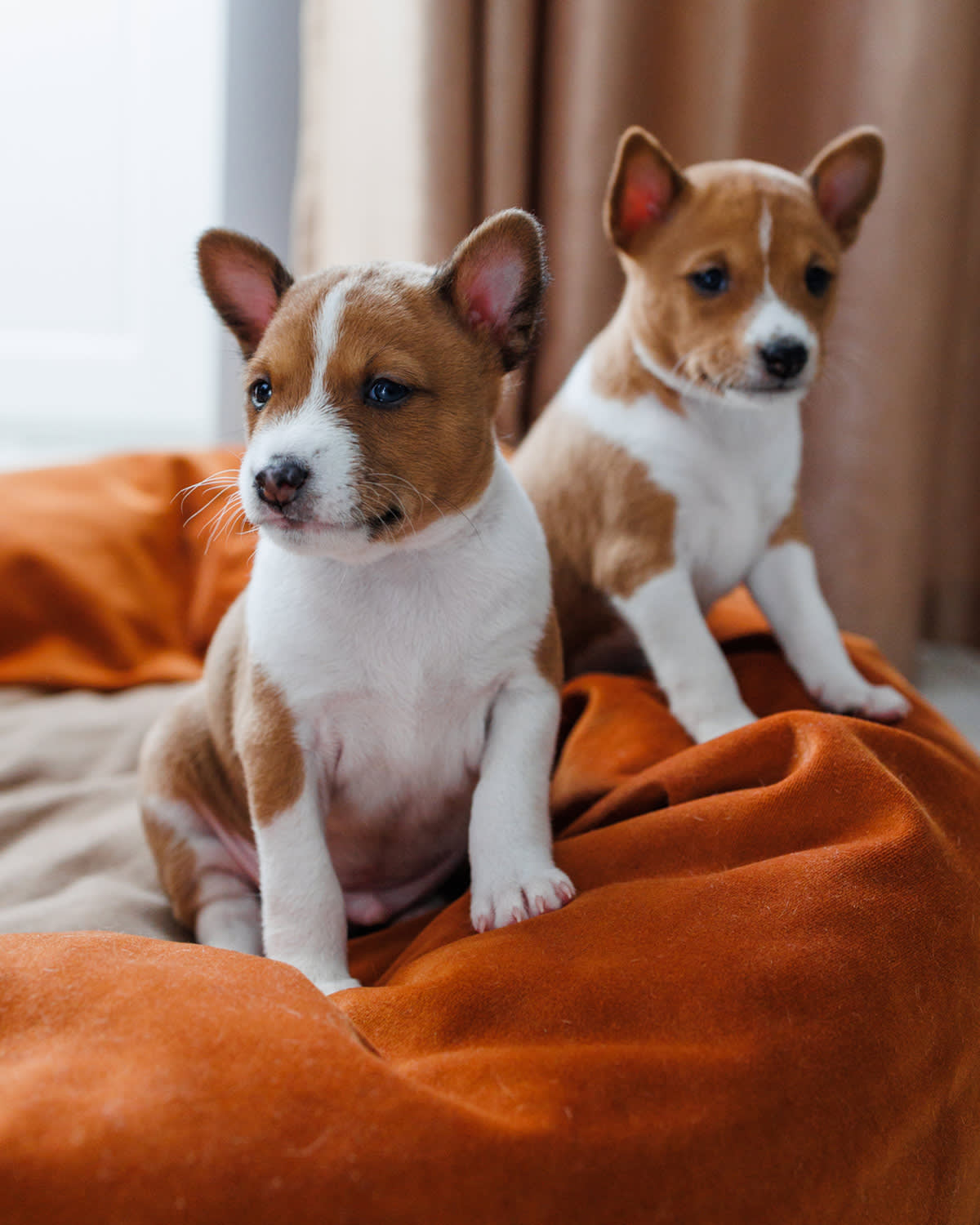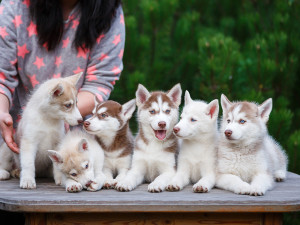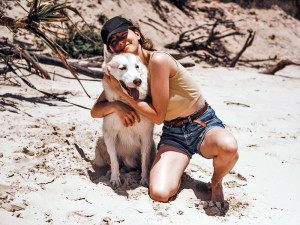How to Find a Reputable Dog Breeder in the UK
Sadly, there are people out there without dogs’ best interests at heart
After much discussion and deliberation, you decide that it’s the right time – you want to bring a puppy into your loving home.
The most ethical way to go about adding a pet to your family is to adopt a dog from a rescue, however if you are set on a particular dog breed and and are looking to breeders instead, it is crucial that you go about it in a responsible way. Sadly, not every seller is a pet loving breeder with their dogs‘ best interests at heart. There are horror storiesopens in new tab around of people buying puppies online, only for their new family members to get very sick days after coming home. Puppy farming – when parent dogs are repeatedly bred to provide puppies for profit – is a very real practice to watch out for as you choose who to buy your puppy from.
“A pup bred by a breeder that puts welfare before profit will likely be a happier, healthier pet,” says Vanessa Holburn, author of How To Pick A Puppy: An Ethical Guide to Choosing the Perfect Petopens in new tab. “In return for doing your research, you can expect to find a health-tested and socialised puppy that will fit into your lifestyle with less problems and be with you for longer.”
So how do you buy your puppy from a reputable breeder?
What makes a reputable breeder?
“A reputable dog breeder is one that loves and understands the breed and is aware of the need for health-tested parents and early socialisation,” says Holburn. “They will insist on one or several in-person meetings at their home, so you can see the mother with her puppies, and will want to meet anyone that lives in your home.”
This type of breeder will want the best homes for their pups and will be interviewing you as much as you‘re interviewing them to assess your suitability. Don‘t be offended, it just means they‘re being responsible.
One means of checking out the breeder is to request documents proving they are licensed and Kennel Clubopens in new tab assured, says Emily Birch, a clinical animal behaviouristopens in new tab. However, if they only have a very small number of litters, they won’t necessarily need a license.
“If you want a pedigree, you want to make sure the dog has been registered so you are aware of the level of inbreeding,” Birch says.
Irrespective of whether or not the breeder is licensed or not, you’ll want a breeder who has done all the health tests on both the parents: hip scores, knee scores, elbow scores, eye tests, and all DNA tests relevant for that breed.
Once you are satisfied that the breeder has met all of these conditions, then you can start looking at the what they do with the puppy.
“You want the dog raised in a home [where they have been] experiencing lots of varied things in a safe and fun way,” says Birch. “They should have been on car journeys, been to the vets, seen so much novelty, been used to sleeping in a crate without their littermates and so on. This means by the time your puppy comes home they’re used to all of this. And above all you want a breeder you build a rapport with – really, they should be offering lifelong back-up for their dogs and this is a friendship to last years.”
Key factors to consider when selecting a dog breeder
Breed knowledge and expertise
When you visit a breeder (and you should definitely be visiting the breeder before buying), they’ll be experts on the traits and quirks of the breed.
“They should know the lifestyle the dog best fits, be that an active, intellectually-stimulating one, or a quieter, less demanding home,” says Holburn. “They’ll have an expectation that you will provide adequate puppy training and the correct amount of exercise and mental fulfilment this type of dog needs. They will also be aware of any health concerns that affect the breed, and the tests that can show this.”
Breeding environment and home conditions
The pregnant mum and her subsequent pups should be kept in a clean, comfortable, and warm environment.
“Ideally, they’ll be in the home so that the puppies can get used to household noises and smells right from the start,” says Holburn. “You must always see the puppies interacting with their mother. A bitch will be interested in her pups, so if you see that she won’t interact with the pups, she may not be the real mum.”
She adds that it’s a great sign if the breeder asks you to wash your hands before touching the puppies – this will show they are aware of infection control.
Genetic health testing
All breeds have specific health tests that the breed club recommends. A reputable breeder will have tested any dogs they own.
“They will want to show you this paperwork,” Holburn says. “If they refuse, walk away.”
Vaccinations, deworming and veterinary care
Your puppy should have been to the vet, where they would have been weighed, checked and given a robust worming procedure to follow at home.
“Depending on when you bring them home will determine if they’ve begun vaccines or not,” says Birch.
If a breeder is hesitant to show, or makes excuses about why they don’t have the necessary paperwork, it should ring alarm bells.
Socialisation practices
By the time a puppy comes to you, a good breeder would have started to socialise the puppy, getting them used to being held and to human voices.
“If puppies are kept away from the home, in an outside shed for example, they will find humans scary and loud,” says Holburn. “A home-socialised pup will be used to typical house noises like footsteps, washing machines, the clanking of plates and even doorbells.”
How to research dog breeders
Utilise breed clubs and associations
The Kennel Club, the UK’s official organisation overseeing dog breed standards (they run Crufts), is a great starting point if you want a specific breed.
They will have reputable breeders on their website, Birch says. “From there, call a few, speak to a few and meet some of the dogs before they have litters. You want to find a breeder with adult dogs you like and then wait for the puppy to be bred. If you’re looking for one that is ready now, you’ve left it too late! That isn’t to say you won’t find one but this is a backward way of finding a good breeder.”
The Kennel Club recently closed its’ assured breeder scheme to make their expertise and tools more widely available to the thousands of breeders registered with them. They now prioritise breeders on their ’find a puppy’ pages who have completed the best practice testing for a specific breed as recommended by their Health Standardopens in new tab.
Holburn also suggests contacting the breed club for the specific breed you’re looking for.
“The breed clubs run their own membership and ensure standards are followed, particularly when it comes to health testing,” she says. “The breed club will likely maintain a list of those people with pregnant bitches, you should expect to join a waiting list and wait for a puppy from a decent breeder.”
Read reviews and testimonials
Although it might be helpful to review testimonials of people who bought from the breeder you’re considering, you should consider contacting people who have had their dogs for quite some time.
“I'd be less inclined to trust word-of-mouth and online testimonials, particularly if the dog owner hasn't had their dog for long,” Holburn says. “Health and behaviour problems linked to poor breeding might only come to light further down the line.”
Visit dog shows and events
Visiting championship shows or field trials (if you’re looking for a gun dog) to meet breeders is another way to research dog breeders.
Questions to ask a potential dog breeder
“When can I visit your home?” If the conditions they are keeping the puppies or dogs in are inhumane, they’ll refuse.
“What are the results of health testing?” This will ensure the tests were actually carried out. You can request the breeder explains what the good results were and verify those later with the breed club.
“What makes a perfect home for this type of dog?” You’ll then be able to assess if you can provide that.
“How long have you been involved in the breed?” You want a breeder who knows the breed well, who isn’t just breeding because the dog of choice at the minute.
“Can you show me your puppy contract?” A decent breeder will have one ready, stating that the dog must come back to the breeder if you can’t keep it, and banning you from breeding the pup without permission from the breeder.
“Has the puppy been microchipped?” They should give you paperwork that allows you to transfer the chip details to yourself. Visit your vet after you have bought the puppy to make sure the details are accurate.
What is a puppy farm?
It shouldn‘t come as a surprise that Birch describes puppy farms as “awful”.
“Dogs are endlessly bred until they’re disposed of,” she says. “The puppies, usually riddled with terrible health conditions and scared of life, are then sold to unsuspecting owners.”
These breeders simply want to make money and will cut costs (food, heating, testing, vet bills) for more profit.
How to spot a puppy farm
Some puppy farms may be licensed by your local council so this isn‘t necessarily a guarantee of welfare. The best way to find out is to visit the breeder to see how the mother and puppies are treated.
Poor living conditions
“Puppy farms have lots of dogs, often many different breeds, in small, dirty cages,” says Holburn. “Sometimes the breeding bitches never see the light, never go on walks and are not treated as pets, just as livestock.”
Lack of proper documentation
Reputable breeders will volunteer proof of genealogy, health checks, vaccinations, worming, and registration. If they are hesitant to show you it, ask if they can post it later, or simply don’t have it, they could be a puppy farmer.
Overbreeding
As puppy farms exist only for profit, they’ll continue breeding a female dog until she physically can’t have any more. Look for a number of outbuildings or sheds that you hear whining or barking from. If the house looks like there have been more puppies here, they might be hiding evidence of overbreeding. Another red flag is if they offer you a different breed from the one you were interested in.
Refusal to let you meet the puppy's parents
Spend enough time with the birth mum and puppies to know that they indeed are mother/child. A dog who has recently had puppies will show clear signs (visible teats) and have bonded with her puppies. If she seems wary of the puppies, she may not be their mum.
“It is now a law (Lucy’s Lawopens in new tab) that you can only buy a puppy when they’re with their mother,” Birch says. “If you see a puppy without their mother they’re breaking the law.”
Refusal to let you visit the home
If the breeder only wants to meet you outside of their home – maybe they offer to meet you at the side of the road, or a motorway services – stay well away from them.
How to avoid a puppy farm or spammer
“Great breeders,” says Holburn, won‘t need to use puppy selling sites to advertise their dogs.
“They have long waiting lists,” she says.
Scammers, on the other hand, who often advertise on social media or online selling sites, love to use the internet to resell puppies bought from puppy farmers.
“They will lie and say anything to make money,” Holburn continues. “They will use friend's homes as a cover, and give false names, details and papers. You simply can't trust someone that advertises this way.” That‘s not to say every breeder advertising online is running a puppy farm, but you do need to take precautions.
You might feel you need to ‘save’ a puppy from a puppy farm, but Birch says this only funds the business model.
“It is so hard to walk away,” Birch says. “Yes, you’re saving a puppy. But if puppy farmers stop making money, they’ll stop breeding.”
What to do if you come across an unethical breeder
First up, never buy a puppy from an unethical breeder.
“These people know exactly what they are doing, and what they can get away with,” Holburn says. “You are not saving or rescuing a pup that you buy from such a situation.”
Instead, report them – to the local council’s licensing department for poor welfare, the police (under Lucy’s Law), or the RSPCAopens in new tab.
Final thoughts: how to find a reputable dog breeder
If you’re looking for a puppy to call your own, make sure you research the breeder, visit the property where the puppies and mum are living (multiple times where possible), observe the puppies in their environment and with their mum, ask lots of questions, request paperwork, and go with your gut.
“When searching for a dog breeder it is your responsibility to put the effort and time in,” concludes Holburn. “If you cut corners at this early stage, you may face heartbreak, huge vet bills and a dog that may die or have to be put to sleep through ill health or behavioural problems. But if you seek out a happy, well-socialised and healthy pup from a responsible breeder then your reward will be many years of love and companionship together.”
Frequently asked questions about finding a reputable puppy breeder
What is the best way to find a reputable breeder?
Through the Kennel Club, breed specific clubs, societies and associations, championships, and shows.
What is the best dog selling site in the UK?
Holburn suggests not buying dogs through random sites, but going through licensed and registered breeders found through the Kennel Club, breed specific clubs and associations, championships, and shows.
How to check if a breeder is licensed in the UK?
If a breeder is licensed, their details will be on the local councils’ public register.
“You will need to check which council a breeder's home falls under and check with the licensing department of that local council,” says Holburn. “You should ask your breeder for their license number and check that it is correct. This is your responsibility.”
Resources
GOV.UK (2020). Lucy’s Law spells the beginning of the end for puppy farmingopens in new tab. [online] GOV.UK. Available at: https://www.gov.uk/government/news/lucys-law-spells-the-beginning-of-the-end-for-puppy-farming.






